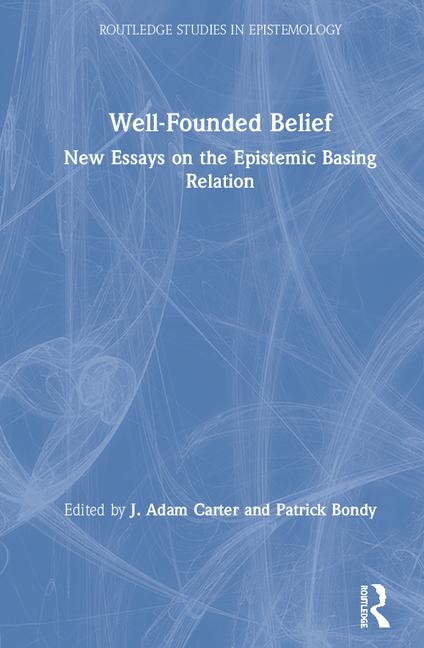Well-Founded Belief: New Essays on the Epistemic Basing Relation 1st Edition J. Adam Carter, Patrick Bondyhttps://www.crcpress.com/Well-Founded-Belief-New-Essays-on-the-Epistemic-Basing-Relation/Carter-Bondy/p/book/9781138503755
SummaryEpistemological theories of knowledge and justification draw a crucial distinction between one's simply having good reasons for some belief and one's actually basing one's belief on good reasons. While the most natural kind of account of basing is causal in nature - a belief is based on a reason if and only if the belief is properly caused by the reason - there is hardly any widely accepted, counterexample-free account of the basing relation among contemporary epistemologists. Further inquiry into the nature of the basing relation is therefore of paramount importance for epistemology. Without an acceptable account of the basing relation, epistemological theories remain both crucially incomplete and vulnerable to errors that can arise when authors assume an implausible view of what it takes for beliefs to be held on the basis of reasons.
Well-Founded Belief brings together 16 essays written by leading epistemologists to explore this important topic in greater detail. The chapters in this collection are divided into two broad categories: (i) the nature of the basing relation; and (ii) basing and its applications. The chapters in the first section are concerned, principally, with positively characterizing the epistemic basing relation and criticizing extant accounts of it, including extant accounts of the relationship between epistemic basing and propositional and doxastic justification. The latter chapters connect epistemic basing with other topics of interest in epistemology as well as ethics, including: epistemic disjunctivism, epistemic injustice, agency, epistemic conservativism, epistemic grounding, epistemic genealogy, practical reasoning, and practical knowledge.
Table of ContentsIntroduction Patrick Bondy and J. Adam Carter Part I: The Nature of the Basing Relation 1. A Doxastic-Causal Theory of Epistemic Basing Ru Ye 2. All Evidential Basing is Phenomenal Basing Andrew Moon 3. Dispositions and the Basing Relation Hamid Vahid 4. The Many Ways of the Basing Relation Luca Moretti and Tommaso Piazza 5. Reasons and Basing in Commonsense Epistemology: Evidence from Two Experiments John Turri 6. Inference and the Basing Relation Keith Allen Korcz 7. The Superstitious Lawyer's Inference Patrick Bondy and J. Adam Carter 8. Prime Time (for the Basing Relation) Errol Lord and Kurt Sylvan Part II: Basing and Its Applications 9. Hermeneutical Injustice as Basing Failure Mona Simion 10. Agency and the Basing Relation Ram Neta 11. Epistemic Conservatism and the Basing Relation Kevin McCain 12. Can Beliefs be Based on Practical Reasons? Miriam McCormick 13. Epistemological Disjunctivism and Factive Bases for Belief Duncan Pritchard 14. From Epistemic Basing to Epistemic Grounding Jesper Kallestrup 15. Well-Founded Belief and the Contingencies of Epistemic Location Guy Axtell 16. The Epistemic Basing Relation and Knowledge-That as Knowledge-How Stephen Hetherington | 
